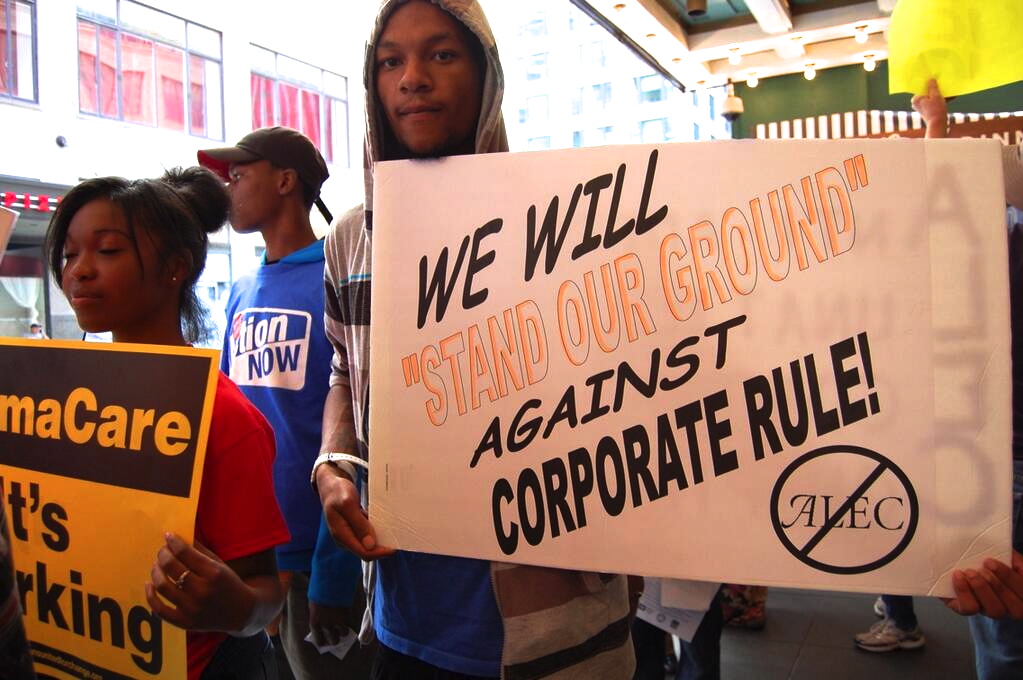
A commitment to high-quality, free public education for all children has long been the foundation of our democracy and prosperity. Although never fully honored, our commitment to an educated citizenry has created a society that is generally literate and able to participate in democratic governance. That commitment is now under multiple attacks by the American Legislative Exchange Council (ALEC), and many ALEC-created bills target public schools, teachers and teacher unions.
One ALEC bill in particular, the "Resolution Supporting Private Scholarship Tax Credits," has mostly flown under the radar - but could have grave, far-reaching consequences.
An Overview of ALEC's Scholarship Tax Credit Campaign
Tuition scholarship tax credit laws, which allow a person or corporation that makes a donation to pay primary or secondary school tuition to take a tax credit - or under some laws, to take a tax deduction - and use state tax codes to subsidize private or parochial education, affect far more than money for private school tuition.
"These laws optimize the warped view of the world that many corporations through ALEC are building toward," said Nick Surgey, director of research at the Center for Media and Democracy, which launched the ALEC Exposed project in 2011. "Their rhetoric might be all about the free market, and they might dress it up by talking about helping kids from poor families, but there is no denying that the real beneficiaries from these laws are those whose intention is to take a wrecking ball to our public education system."
A handful of states have enacted versions of private scholarship tax credit laws: Alabama, Arizona, Florida, Georgia, Illinois, Indiana, Iowa, Louisiana, New Hampshire, North Carolina, Oklahoma, Pennsylvania, Rhode Island, South Carolina, Virginia and Wisconsin. Other states are likely to join that list.
In 2013, the Idaho House approved a tuition tax credit scholarship 35-33, but it failed to get out of the Senate Taxation Committee by a 7-2 vote. According to state Sen. Bob Nonini (R-Couer d'Alene), if enacted, this bill would shift approximately 2,600 children from public to private schools. It seems likely that this bill will come up for consideration again.
In the last term, the US Supreme Court's conservative majority dismissed a case that questioned the constitutionality of Arizona's tuition tax credit law on the grounds that the plaintiffs lacked standing to bring the claim. That dismissal did not rule on the merits of the case. A New Hampshire case is on the Supreme Court's docket for 2013-14.
What Effects Does a Tuition Tax Credit Law Have on Education?
Private scholarship tax-credit laws threaten to break down the public school system - and the core principle it represents - on multiple levels. First, by transferring money from state budgets to private hands, these laws draw down state government budgets, leaving less money for public needs. Second, it promotes student exit from public school systems, and, third, it subsidizes parochial school tuition, potentially violating the separation of church and state.
ALEC's bank of model private tuition scholarship bills vary widely. Some provide state tax deductions rather than credits; some focus on special needs children; some apply to individuals only, while others apply to corporations and individuals. But the laws have four basic features in common:
-
The tuition scholarships may be funded by a corporation or individual depending on how the law is drafted.
-
The funder may be reimbursed through a tax credit or tax deduction, depending on the law, and some states have dollar or other limitations.
-
By transferring money from state budgets to private hands, these laws assure public schools have less money to provide quality education. These "tax expenditures" are like traditional forms of public spending. They affect the amount of money in state and federal budgets and influence how people work, save and invest.
-
Tax credit scholarships tend to be directed toward parochial schools. A county-by-county list of Pennsylvania's program showed that virtually all schools eligible to receive tax credit scholarships were parochial schools.
These Laws Affect Us All
The push toward tuition tax credits raises constitutional law issues - particularly questions around the separation of church and state. The laws directly use public money to support religion.
Economists call both tax credits and tax deductions "tax expenditures," because they have the same effect as the government's spending that money directly. As a result, the ALEC laws unquestionably result in funneling government money into explicitly religious educational institutions.
Moreover, not only do these laws make state budget problems worse by siphoning money from public education, they transfer our elected officials' power and duty to make public decisions to private individuals.
Do Poor Children Benefit from Scholarship Tax Credit Programs?
ALEC claims that "privately-funded [sic] scholarships are an excellent and popular means by which parents and guardians can exercise expanded educational opportunities for their children, especially children from low income families and the minority community." According to ALEC, tax credits "for contributions to nonprofit scholarship or educational assistance organizations will make more privately-funded scholarships available, and thereby expand the educational opportunities available to children of families that have limited financial resources and increase the academic achievements of children across the country."
But are these claims true?
An in-depth New York Times report found that only a small percentage of scholarship tax credit money was directed toward needs-based scholarship funds. Instead, much of the money has been channeled to the family that raised it. "A handout circulated at the meeting instructed families to donate, qualify for a tax credit and then apply for a scholarship for their own children, many of whom were already attending the school."
Rather than offering poor children opportunities to transfer out from failing schools, the tax credit scholarship eligibility requirements and data on poverty mean that middle class families will benefit most. For 2013, the federal poverty guidelines range from $15,510 for a family of two to $39,630 for a family of eight, while the Pennsylvania scholarship program's maximum eligibility for a scholarship is $75,000, twice the poverty level for a family of eight. Families whose income is well above the federal poverty level still may struggle to pay private school tuition, but setting the income level so high makes less money available for those with the most need.
What's more, higher-income people are more likely to use a tax credit, because they have access to tax advice. Plus, their higher tax bracket makes using the credit worthwhile. According to the 2013 Friedman Foundation annual report, "The average scholarship value is only about $990." A $990 scholarship might be helpful to a middle-class family but would be insufficient to move a child in poverty into private school. In addition to the cost of tuition and books, the families of children in poverty may lack transportation as well as access to information about schools and scholarships.
Corporations Doing Really Well by Doing Maybe a Little GoodIn some states, businesses are eligible for scholarship tax credits or deductions. Pennsylvania's Opportunity Scholarship Tax Credit Program (OSTC) is available to businesses only. In 2013, it allows a business to contribute up to $400,000 and take a tax credit for 75 percent of the business' contribution. Credits can climb as high as 90 percent if the company commits to make contributions for two years. In other words, to entice a company to make a $400,000 contribution, the people of Pennsylvania fork over $300,000 to the company. For a two-year commitment, the Pennsylvania treasury must pay the corporation $360,000, while the donor corporation pays only $400,000. That company may pay even less by claiming the donation as a federal charitable deduction.
According to The ABCs of School Choice - The Comprehensive Guide to Every Private School Choice Program in America, 2013 Edition, the maximum companies can pay into the Pennsylvania program in 2013 and beyond is $750,000 per company. In fiscal year 2012-13, OSTC received $50 million, and even more can be expected for the coming years.
One less visible - but still significant - aspect of corporate tax credit scholarship programs are opportunities for corporate greenwashing. Rhode Island's "Scholarship Alliance" includes a web page of donor testimonials:
"At FM Global, we believe we have a responsibility to support the community around us. The Rhode Island Corporate Scholarship Tax Credit program is good for families in need, good for businesses and good for our state's long-term economic well-being." Shivan. S. Subramaniam, Chairman and CEO of FM Global. "CVS/pharmacy is proud to support this innovative approach that empowers parents to select the educational environment they feel is best for their child." Elleen Howard Dunn, Vice President, Corporate Communications and Community Relations, CVS Corporation. "At Citizens, we believe in the 'Three Cs'– customers, colleagues, and community. Being a strong community partner enables us to help our neighbors achieve their own goals." Joseph J. MarcAurele, President and CEO, Citizens Bank of Rhode Island. "Investing in the future success of our state's youth should be a critical priority for all Rhode Islanders." William F. Hatfield, President, Bank of America Rhode Island.
The New York Times study found that companies and industries with bad reputations have used school scholarships to boost their reputations. For example, according to The New York Times:
When the gas drilling company XTO Energy made generous donations for private school scholarships in Pennsylvania, the corporate largesse was hailed in ceremonies across the state. The media events began in 2010 and have generated a burst of good will for XTO at a time when the controversy over the hydraulic fracturing drilling method has been growing in Pennsylvania. One state official remarked that the company, which donated $650,000 over the past three years, had gone "above and beyond" its duty. In reality, as much as 90 percent of XTO's donation was underwritten by taxpayers.
Democracy Under Fire
Our public school systems have long played a central role in supporting democracy. Those systems are now under attack. We who value democracy must be on the lookout for bills that quietly deplete our already-scant public education resources, all the while devaluing the principle of public education as a whole. Pay attention to what your state legislators are up to, and let them know your concerns.
3 WAYS TO SHOW YOUR SUPPORT
- Log in to post comments



















